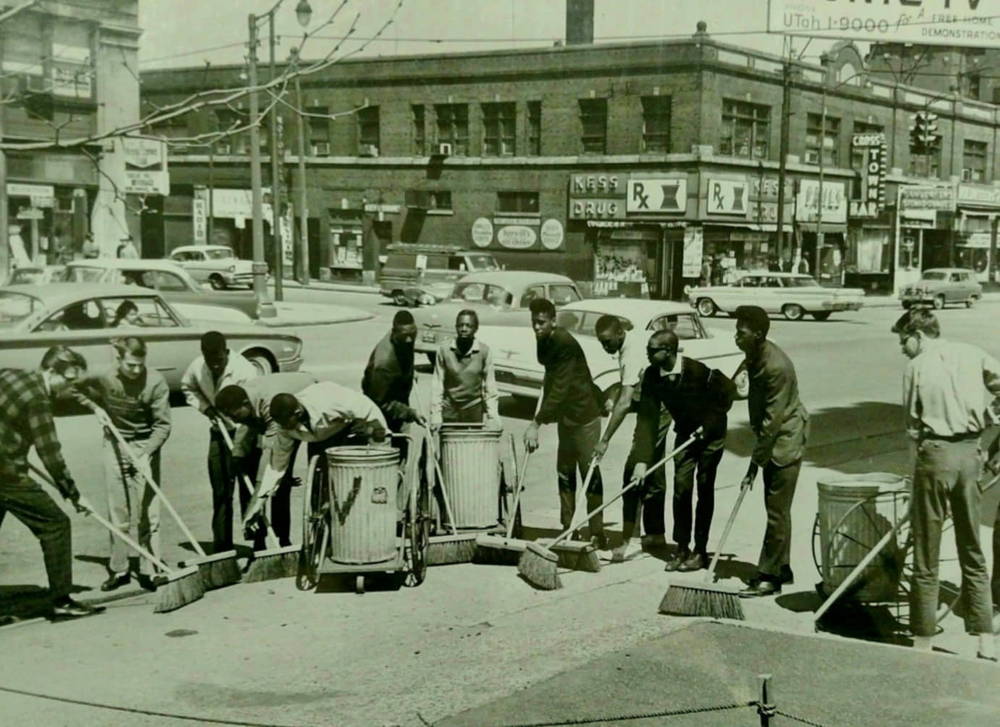
In 1991 a derailed construction project had left an abundance of weeds and hills of mounded dirt in the vacant 19.3-acre lot that stretched from East 79th to East 84th Street between Euclid and Chester Avenues. The project to build a shopping center for east side Clevelanders had been postponed after its 1986 reveal, leading to a string of buyouts, sellouts, and revisions. However, from the efforts and dedication of NOAH (Neighbors Organized for Action Housing), the importance of the project was finally realized by the Cleveland City Council. The Church Square shopping plaza symbolized a crowning achievement in the undertaking to rejuvenate highly visible Euclid Avenue face of the Hough neighborhood.
NOAH started in response to the devastation left by the Hough Riots of 1966. The leaders of Calvary Presbyterian Church, St. Agnes Church, Glenville Presbyterian Church, and the Hough Community Council joined forces in 1968 to construct and/or advise the construction of adequate housing for the local residents of Hough. Calvary under the leadership of Rev. Roger Shoup provided the seed money to get the grassroots redevelopment project in motion. Along with Calvary's seed money, the group also obtained federal funds to jumpstart the housing project. NOAH sought opportunities to purchase land or locate buildings that could be rehabilitated. Even in the organization's infancy, NOAH envisioned that in a three-year period up to one hundred family units would be constructed or rehabilitated up to code. NOAH stood out as an organization as it championed a holistic approach towards the redevelopment of Hough and adjacent neighborhoods.
NOAH not only provided adequate family and single dwelling units for the Hough community residents. NOAH sought to rehabilitate not only housing in the area, but also the individual. Those who moved into one of NOAH's housing developments were encouraged to attend church programs and take advantage of counseling services. Church Square plaza was envisioned to complete this holistic aim of the project. Developers, from a stipulated string attached to the city council loan allocated to bail out the project, were required to hire local Clevelanders for the construction of the plaza and for permanent jobs. Church Square gave local residents, many of whom lived in NOAH housing like Rainbow Place apartments on the northwest corner of Euclid Avenue and East 79th Street, a place to seek employment opportunities.
Church Square was an important piece of a larger effort to revitalize the Fairfax and Hough neighborhoods. By 1992 the once-vacant lot on the northeast corner of East 79th and Euclid heralded the promise of economic advancement for the neighborhood. Church Square represented an important step towards achieving the successful revitalization of the Hough community. Church Square sought to provide a local and easily accessible place for community residents to do their shopping. The shopping plaza also offered middle-class shoppers speeding down Chester or Euclid Avenues from their suburban residences to downtown a quick stop to meet their consumer needs. With the promise of an influx in outside revenue and jobs for local residences, many fragile futures hinged on the success of Church Square. Today the notable hustle and bustle around the plaza symbolizes a piece of a comprehensive and successful grassroots effort to revitalize one of Cleveland's downtrodden districts.
Audio
Images





